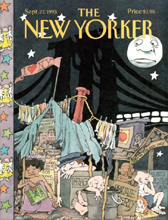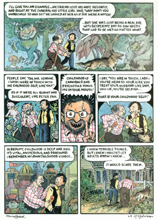
Maurice Sendak, the illustrator-turned children’s book author whose vision of childhood as "cannibals and psychotics vomiting in your mouth" was a far cry from sugarplum fairies, has died at the age of 83 from complications from a stroke he suffered last Friday.
Inspired to become an illustrator after seeing Disney’s Fantasia at the age of 12, the Brooklyn-born Sendak spent most of the decade of the 1950s illustrating books written by others, but his 1963 solo effort Where the Wild Things Are, a brilliant rendering of childhood anger and imagination became (after a slow start) a monster hit with more than 10 million copies sold in the United States alone. Every American generation born since 1965 has been raised on Where the Wild Things Are, which was adapted into a memorable live-action movie directed by Spike Jonze in 2009.
Inspired to become an illustrator after seeing Disney’s Fantasia at the age of 12, the Brooklyn-born Sendak spent most of the decade of the 1950s illustrating books written by others, but his 1963 solo effort Where the Wild Things Are, a brilliant rendering of childhood anger and imagination became (after a slow start) a monster hit with more than 10 million copies sold in the United States alone. Every American generation born since 1965 has been raised on Where the Wild Things Are, which was adapted into a memorable live-action movie directed by Spike Jonze in 2009.
When it was published Where the Wild Things Are met with some resistance and was banned in a few libraries, but its censorship troubles were nothing compared with Sendak’s 1970 volume In the Night Kitchen, which featured a young protagonist (Mickey) who floats naked through a series of dream adventures in the Night Kitchen (though he is covered with batter for a while, he does dive into bottle of milk in a particularly memorable scene). If it were easy to capture the bizarre illogical juxtapositions of dreams and create compelling narratives there would be a lot more books like In the Night Kitchen and Where the Wild Things Are. The fact that there aren’t testifies to Sendak’s special gift. Unfortunately because of the nudity, which is not prurient and is necessary for the narrative, In the Night Kitchen was ranked #25 on the list of the 100 most challenged books 1990-2000 compiled by the American Library Association.
Blown Covers has posted a wonderful two-page comic story from The New Yorker by Art Spiegelman, which recounts a visit by Spiegelman to Sendak’s Connecticut home and presents a wonderful unvarnished, yet deeply admiring portrait of the artist and his irascible world view.
Sendak produced occasional comic stories including the uproarious “Cereal Baby Keller” which was included in the 2001 Little Lit anthology Strange Stories for Strange Kids.
Sendak produced occasional comic stories including the uproarious “Cereal Baby Keller” which was included in the 2001 Little Lit anthology Strange Stories for Strange Kids.




